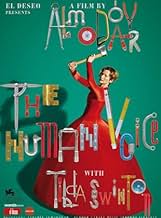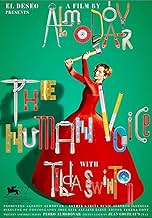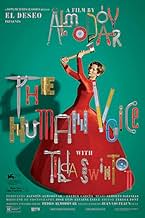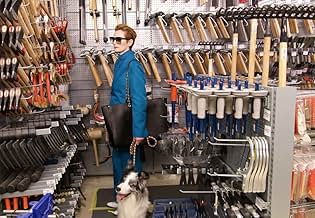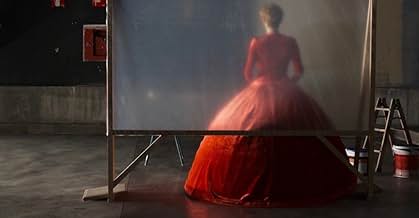IMDb-BEWERTUNG
6,8/10
9739
IHRE BEWERTUNG
Eine Frau beobachtet, wie die Zeit vergeht, neben den Koffern ihres Liebhabers, der sie abholen sollte, aber nie kommt und einem Hund, der nicht versteht, dass sein Herrchen ihn verlassen ha... Alles lesenEine Frau beobachtet, wie die Zeit vergeht, neben den Koffern ihres Liebhabers, der sie abholen sollte, aber nie kommt und einem Hund, der nicht versteht, dass sein Herrchen ihn verlassen hat. Zwei Seelen, die vor der Verlassenheit stehen.Eine Frau beobachtet, wie die Zeit vergeht, neben den Koffern ihres Liebhabers, der sie abholen sollte, aber nie kommt und einem Hund, der nicht versteht, dass sein Herrchen ihn verlassen hat. Zwei Seelen, die vor der Verlassenheit stehen.
- Regie
- Drehbuch
- Hauptbesetzung
Empfohlene Bewertungen
When long ago I saw Rossellini's version of this play by Cocteau with an audience of students the most memorable moment came when Anna Magnani finally put down the phone, promptly picked it up and started dialling again and everyone in the cinema groaned en masse.
The play has yet to be filmed in French, in Pedro Almodovar's first film in English this time it has brevity on it's side and it's Tilda Swinton's turn to be the woman on the verge of a nervous breakdown.
The original was in black & white but in true Almodovar style Swinton uses an earphone that makes the proceedings seem more like an interior monologue as she prowls about cigarette in hand dressed in chic little outfits in bright pastel colours complemented by the decor and even the pills that she pops.
The play has yet to be filmed in French, in Pedro Almodovar's first film in English this time it has brevity on it's side and it's Tilda Swinton's turn to be the woman on the verge of a nervous breakdown.
The original was in black & white but in true Almodovar style Swinton uses an earphone that makes the proceedings seem more like an interior monologue as she prowls about cigarette in hand dressed in chic little outfits in bright pastel colours complemented by the decor and even the pills that she pops.
Jean Cocteau's play La Voix Humaine (The Human Voice) opened at the Comédie Française in 1930 as a atar vehicle for Belgian actress Berthe Bovy, then popular in Parisian stages. The work involves a woman, only identified as Elle = She, speaking on the telephone with his lover of several years, who is leaving her.for another woman. Her interlocutor is silent for the duration and we don't even know for sure if he is listening or if the connection has been broken.
The play had an enduring popularity, and has been since in the repertory of many theater companies. It was put on screen several times, among them by Roberto Rossellini (first episode of L'Amore 1946: actress Anna Magnani) and by Ted Kotcheff (1966: actress Ingrid Bergman). It even had a second life as an opera by Francis Poulenc in 1958, which has been as well accepted as the play and is still being staged and recorded.
This being the Almodóvar version, we may expect some off the wall happenings. One is a very funny scene where the protagonist browses for axes in a hardware store that seems to have an unusually large inventory of the item. On another, the axe in question is used in a hilarious way. We are shown mid-movie that She's apartment is actually a set in a sound stage which is perhaps a gentle dig at he artificiality of the play. And, last but not least, we have the director's trademark, cinematography in gloriously saturated colors. Tilda Swinton does an outstanding job as She; she tones down the melodrama and borders on the humorous at times. All in all, a refreshing take on the play and the best version I have seen.
The play had an enduring popularity, and has been since in the repertory of many theater companies. It was put on screen several times, among them by Roberto Rossellini (first episode of L'Amore 1946: actress Anna Magnani) and by Ted Kotcheff (1966: actress Ingrid Bergman). It even had a second life as an opera by Francis Poulenc in 1958, which has been as well accepted as the play and is still being staged and recorded.
This being the Almodóvar version, we may expect some off the wall happenings. One is a very funny scene where the protagonist browses for axes in a hardware store that seems to have an unusually large inventory of the item. On another, the axe in question is used in a hilarious way. We are shown mid-movie that She's apartment is actually a set in a sound stage which is perhaps a gentle dig at he artificiality of the play. And, last but not least, we have the director's trademark, cinematography in gloriously saturated colors. Tilda Swinton does an outstanding job as She; she tones down the melodrama and borders on the humorous at times. All in all, a refreshing take on the play and the best version I have seen.
This has quite a lot to live up to. The 1966 version with Bergman is a masterpiece. Plus this is directed by Pedro Almodóvar AND it's his first English language film. I've been itching to see this for a long time. Delayed like many films due to the pandemic, my expectations have been heightened. Always dangerous going into a film. This was interestingly shot during lockdown, behind the scenes shots showing the crew in masks. I suppose this might be the perfect film project for social distancing. In place of Bergman is Tilda Swinton. She's not in the same intimate setting as her predecessor. In fact she's a lot more freedom, starting browsing axes in a hardware store. The premise is the same though. An unnamed woman, alone after being left by her lover. Only a dog for company. Even here though, things are dialled up, the dog can act! Also pining for the now missing man, seriously the dog is great! What's also great is her apartment. It's gorgeous! Modern clean lines, bold colours. It screams taste and control. Inexplicably though, it's not shown to be a real apartment. It's a set, built in a warehouse-like sound stage. I've not yet decided why, other than it looks wonderful as we see aerial shots, Swinton moving from room to roofless room smashing things in anger and frustration. We're a third way in before the phone rings. This time an iPhone with AirPods. Here we get closer to Bergman's portrayal. The monologue taking centre stage as Swinton wanders in and out of hers. It's a much more stylised interpretation and feels a little soulless in places for it, but it still works. The relationship described is much more modern, less traditional, less conservative, but the emotions are just as raw and Swinton delivers with just as effective might. Is it better than the 1966 version? No, but I think it might be as good, or very very close. I might need to watch it a few times to appreciate it fully. Swinton though is undoubtably brilliant and Almodóvar has updated the premise with all the invention you'd expect. It might even have a better ending. My expectations were high and I wasn't disappointed.
A film about the world, about loss and about the pressures of reality. A beautiful performance from Swinton. The colours, phrasing and staging are just wonderful. A great watch and in places humorous some how.
While Swintons performance is a great showcase for her range and understanding of this character - The Human Voice can feel a bit to self indulgent and overly sarcastic. Almodovars direction shines in the moments where Swinton dominates the screen but falters when trying to build a world around her that would support the feeling of the emotional turmoil she is in.
Wusstest du schon
- WissenswertesThis is Pedro Almodóvar's first film in English.
- VerbindungenFeatured in Projector @ LFF: One Night in Miami/The Human Voice (2020)
Top-Auswahl
Melde dich zum Bewerten an und greife auf die Watchlist für personalisierte Empfehlungen zu.
Details
Box Office
- Weltweiter Bruttoertrag
- 164.623 $
- Laufzeit
- 30 Min.
- Farbe
- Sound-Mix
- Seitenverhältnis
- 1.85 : 1
Zu dieser Seite beitragen
Bearbeitung vorschlagen oder fehlenden Inhalt hinzufügen

![Tráiler [OV] ansehen](https://m.media-amazon.com/images/M/MV5BYzQyNTRjNDMtMDU3MS00M2M2LWIwMDQtYThjNTllZmE2ZWQ2XkEyXkFqcGdeQXRyYW5zY29kZS13b3JrZmxvdw@@._V1_QL75_UX500_CR0)


